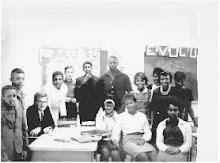Facilitative Pretending - Acting So, Can Make it So
While children’s play has been a focus of study for generations, it is only recently, that it again is coming into consideration as a means of promoting literacy and academic learning (Korat, Bahar, Snapir, 2002). However easy and inviting play is as a means of teaching without appearing to teach, it is not easily done. It requires considerable thought and planning on the part of the teacher.
Facilitative Role Play (FRP), or more simply Facilitative Pretending, is based on such an appearance of being a simple idea. The goal is to get students acting-out competent, socially poised, expert readers, writers and thinkers, because then they will more carefully watch and think about what the “experts” do, and better coach themselves. This heightened level of concern coupled with motivated self-teaching seems to raise students’ levels of performance and learning almost immediately. Facilitative Pretending is child to a rich parental history of play therapy, as originally outlined by Virginia Axeline in 1946, and psychodrama therapy, as discussed by J.L. Moreno in 1947. This technique survives today in a more muted form in several reading/language arts methods and practices. These include:
1. Peer teaching, as when a relatively poor reading 5th grader is asked to teach a Kindergartner or first grader to read, and in the process considerably improves his own reading.
2. In the Reciprocal Questioning (ReQuest) procedure (Manzo,1969a, b) where a student is urged to ask questions the way a teacher might, and does so with great alacrity as a result of paying closer attention to how teachers ask questions, and therefore to the material from which the questions are drawn.
3. In Radio Reading where children asked to practice by repeated readings of a section of text with a partner and/or at home until they feel comfortable enough to stand behind the class and read it as if they were a radio announcer.
4. With InQuest (Schmitt, 1988 ) where students play the role of reporters and must question their way to successful understanding of a story or non-fiction piece.
5. With SocioDramatic play (Korat, Bahar, Snapir, 2002) where teachers and adult voices step into the middle of child created plays to direct attention to literacy artifacts.
6. And, in invented spellings and pretend reading, two basic routines of Emergent Literacy that encourage self-teaching, the sine qua non of all instruction.
The essential power of such “role playing” methods seems to be in converting what students do most naturally into enactment of more competent models than they feel themselves capable of outside of the dramatization. This, it has been noted, seems to be instrumental in having children internalize the external coaching of teachers and models of more competent peers (Manzo, 1969b; Manzo and Manzo, 2002; Vygotsky 1978). Facilitative Pretending tends, further, to add an element of practice to tasks that students otherwise try to do without rehearsal, hence adding the simple power of “practice effects.” Consider the potential in a 400 year old European tradition of requiring brief writing, combined with a broadly defined form of Facilitative Pretending that requires thinking from multiple perspectives.
See: Strategic Parroting and Translation Question Magic on other posts.
In: Instructional Ingredients: Educational Chefs Share Tricks of the Trade
Anthony Manzo & Ula Manzo
California State University-Fullerton
Avmanzo@aol.com & Umanzo@fullerton.edu
In:
Thinking Classrooms (Russian Language Journal of the International Reading Association),5,3(July, 2004) pp34-40
Subscribe to:
Post Comments (Atom)

No comments:
Post a Comment